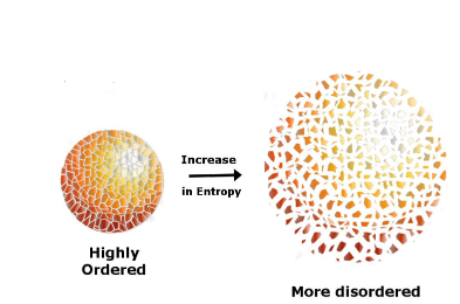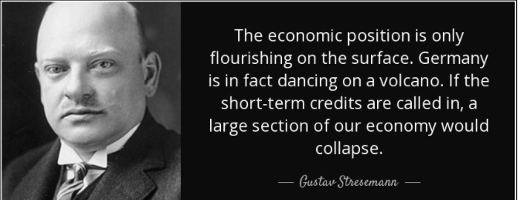"Entropy" is an interesting word. It has two meaty definitions, the first is very scientific and the second is very interesting. Here is the official definition from Webster's:
1. A thermodynamic quantity representing the
unavailability of a system's thermal energy for conversion into mechanical
work, often interpreted as the degree of disorder or randomness in the system.
"The second law of
thermodynamics says that entropy always increases with time."
2. Lack of order or predictability; gradual decline
into disorder.
"A marketplace where entropy
reigns supreme."
The first definition is kind of scary. "Entropy always
increases" means that eventually the Universe will suffer heat death, when
everything stops, or so some of my engineering-degreed colleagues tell me. But
that will be many billions of years from now, so I think we can safely focus on
the second definition today.
Entropy as a lack of order, a lack of predictability, a gradual decline into disorder. In the realm of portfolio management, that is scary enough.
When I started digging into this topic, it really struck me that
I have been watching, advising, and discussing portfolio management for 25
years and I have seen this sort of entropy all the time. It's not a decline
into chaos, but rather it is a slow decline into a lack of discipline.
Portfolio management should be an extremely disciplined process. It's not a
random walk theory whereby we just buy a little bit of everything with the hope
that nothing blows up too badly. Sadly, as I watch portfolio managers across the
spectrum from fixed income to equities, I see this gradual decline into
disorder. When markets are fairly boring, it could become easier and easier to slip
into an entropic haze and start doing things that just don't make sense.
Remember, the easy path is towards entropy, and eventually chaos.

I think it really comes down to two very disparate
approaches. The first (and worst) is a very passionate intensity where someone
practices an approach of "diverse" sectors, an effort to ensure that there is
enough variety within the portfolio, always a having certain proportions of
certain specific sectors, under a relatively fixed policy, often written in the
distant past! The problem with this approach of managing by sector is that there
is no sector that is always a good investment. None. When we blindly and/or passionately
manage a portfolio by a prescribed percentage or allocation, those currently
good and those currently poor, we guarantee that at best we will be average. We
must be willing to that admit at any time certain sectors or groups of sectors will
be sub-optimal, and don't belong (for the moment) in our portfolio.
The second (and more difficult) path takes intensity, determination,
and process. One of the things that we have been teaching for years is the
seemingly easy, but difficult to adopt, truth that good portfolio management requires
a simple, disciplined process. We need to identify current poor risk/rewards
and eliminate them. We need to attempt to identify current good or even great
risk/rewards and acquire them. And finally, we need to try to identify good
combinations of risk/rewards—whose value can only be seen in that combination—and
execute them.
One of the things that we have been teaching for years is the seemingly easy, but difficult to adopt, truth that good portfolio management requires a simple, disciplined process. We need to identify current poor risk/rewards and eliminate them. We need to attempt to identify current good or even great risk/rewards and acquire them. And finally, we need to try to identify good combinations of risk/rewards—whose value can only be seen in that combination—and execute them.
Let's focus on the first point. When we can identify poor
risk/rewards, we need to eliminate them from our portfolio. This can be painful,
because as the portfolio manager this often means that you probably originally
acquired this "poor" risk/reward. That means that you either made a bad
decision originally, or that something has changed. This may also mean that you
need to realize a loss, which is never pleasant. Therefore, it becomes so important to be able
to articulate why the investment is sub-optimal. This is where the idea of
intensity, determination, and process kicks in. It takes effort to show people
why an investment (potentially your prior decision) has become a less optimal
risk reward decision going forward. Initially, it feels scary and a
little intimidating, but once you have fully established this more difficult
process on an ongoing basis, the payoff can be tremendous. As I mentioned last
week, it does take some bravery to admit a mistake, but in the long-term it usually
pays huge dividends.
Think about the alternative, which we discussed above. Being
extremely passionate and having a lot of intensity in following a recipe—even
when it is suboptimal—is the much easier path. You can ignore the value of past
decisions, if they followed the allocation requirements, and so be passionate
in saying you "did the right thing." It's a strange conundrum but being
passionate in defense of poor choices can be the easier path. Being humble and
contrite about a bad decision is so much more impactful. People will remember
it and, as Screwtape said in his toast which I discussed last week: "I'm as
good as you," doesn't work. Your peers will know that you will let them know when
you've made a bad decision. Wow. Powerful character trait, too.
As Shakespeare expressed in his classic play Hamlet, "the
Lady doth protest too much, methinks."
Going back to the title: entropy. We must remember that eventually markets will move to a more disordered reality.

Let's go way back to the 1920s. The market was roaring at
that time. Inflation was starting to sneak into the equation and several of the
then-dominant economies, namely France and Germany, left the gold standard. The
market was soaring and had reached new highs. The "Great" War had ended, but as
Gustav Stresemann (the German Foreign Minister) said at a speech to the League
of Nations in 1929, "Germany is, in fact dancing on the edge of a volcano."
Shortly thereafter, the stock market—and financial markets in genera—absolutely
collapsed. Germany, France, and Britain lost nearly 50% of their gold reserves
within 12 months largely due to the U.S. calling in their short-term loans. The
problem was that all these governments had been borrowing like crazy and suddenly
credit disappeared.
The volcano exploded and chaos ensued. And the U.S. had it
better than most! Yet, one of every seven U.S. banks failed within 24
months.
Entropy will increase, sometimes slowly, sometimes more
rapidly, but it always will increase. A disciplined approach is so critical in times
when this becomes apparent to all as pride and passionate defensiveness will
not get us through them.
Final, final thought: I recently discovered Blue Diamond
Bold Salt 'n Vinegar Almonds. They are incredibly addictive and very tasty…give
'em a try.
Be sure to fill out the form below to subscribe to my weekly blog.


